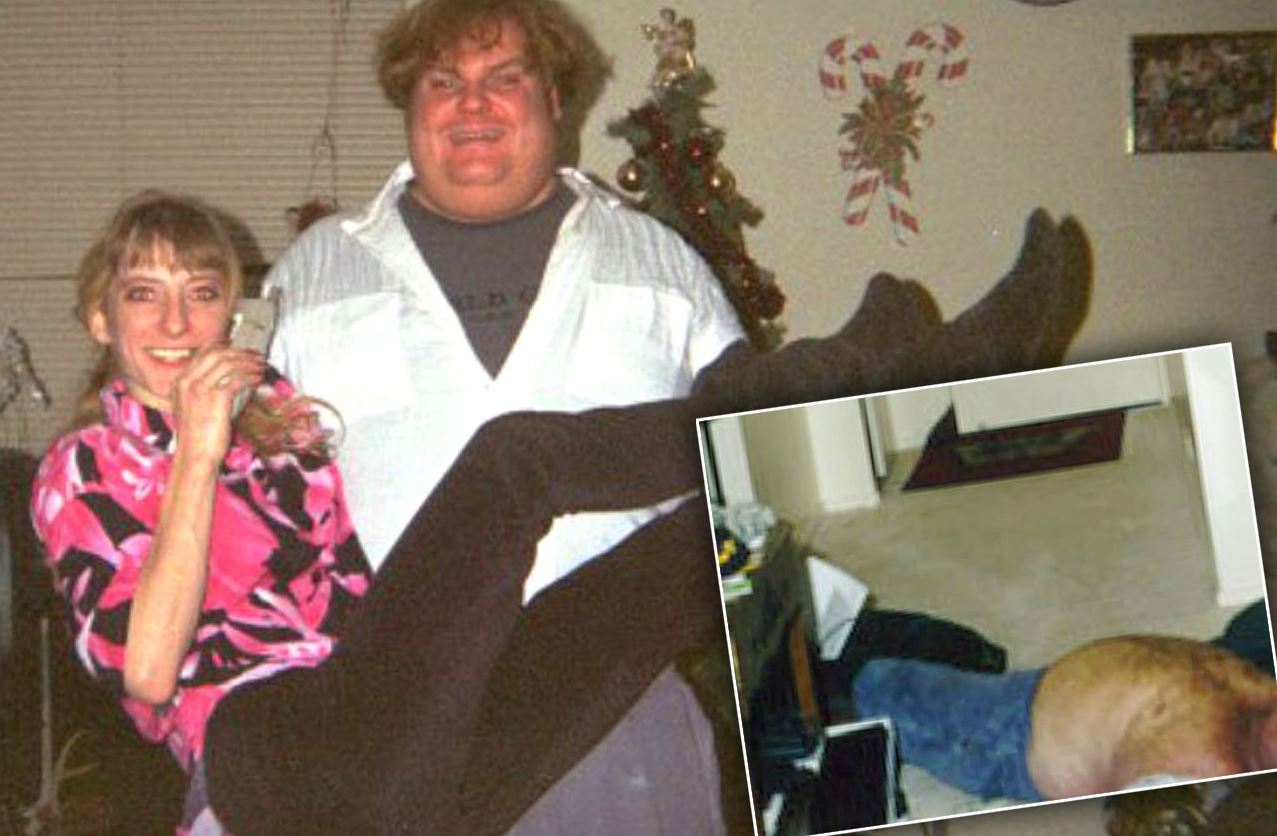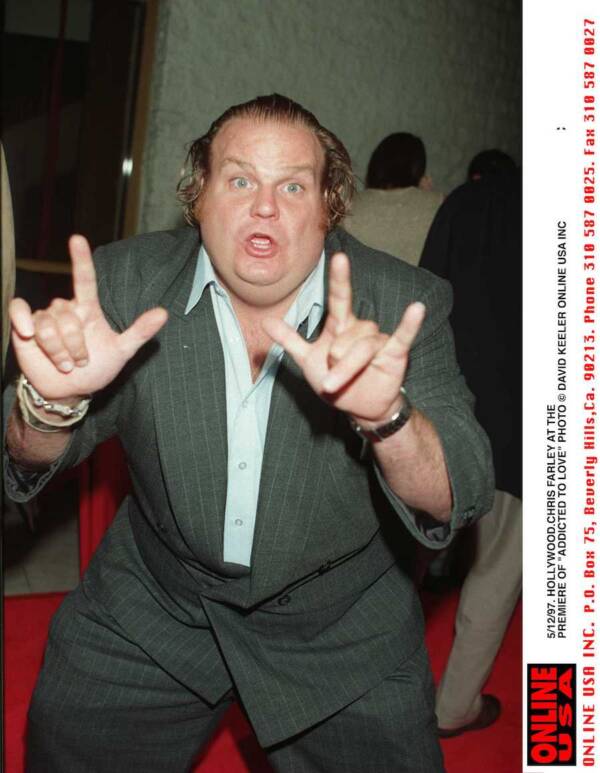Chris Farley's Tragic Death: Untold Story & Legacy
Can the brilliance of a comedic genius be extinguished by the very demons that fueled his fire? The tragic death of Chris Farley at the age of 33, a result of a cocaine and morphine overdose, serves as a stark reminder of the fragility of life and the hidden battles fought by those who bring laughter to millions.
The world of comedy mourned the loss of Chris Farley on December 18, 1997. The news of his passing sent shockwaves through Hollywood and beyond, leaving fans and colleagues alike reeling from the suddenness of it all. He was a beloved figure, a larger-than-life personality whose physical comedy and self-deprecating humor had captivated audiences for years. His performances on Saturday Night Live and in films like Tommy Boy and Beverly Hills Ninja had solidified his place as a comedic icon, but beneath the surface of his success, a different story was unfolding.
Farley's death was a profound loss, not only for his family and friends but for the entire entertainment industry. He was a talent whose potential seemed limitless, and his untimely demise robbed the world of countless future performances. His passing also brought into sharp focus the dangers of addiction and the toll it can take on even the most successful individuals. The details of his final days, revealed in the aftermath of his death, painted a picture of a man struggling with internal conflicts, battling personal demons that ultimately led to his tragic end.
| Category | Details |
|---|---|
| Full Name | Christopher Crosby Farley |
| Born | February 15, 1964, Madison, Wisconsin, USA |
| Died | December 18, 1997 (aged 33), Chicago, Illinois, USA |
| Cause of Death | Drug Overdose (Cocaine and Morphine) |
| Known For | Comedian, Actor; Saturday Night Live, Tommy Boy, Beverly Hills Ninja |
| Education | Marquette University |
| Key Collaborations | Adam Sandler, Chris Rock, David Spade |
| Legacy | Influential comedic performer, remembered for physical comedy and relatable characters. |
| Reference | Biography.com |
Farleys journey to stardom began in the vibrant comedy scene of the Second City Theatre. From there, he joined the cast of Saturday Night Live, where he quickly became a breakout star. His energetic performances, his willingness to embrace the absurd, and his knack for physical comedy resonated deeply with audiences. Characters like Matt Foley, the motivational speaker who lived "in a van down by the river," became iconic, capturing the spirit of a generation.
The comedian's rise to fame was meteoric. His appearances on SNL were legendary, and his collaborations with other comedy giants, such as Adam Sandler, Chris Rock, and David Spade, produced some of the most memorable skits and performances in the show's history. The chemistry between Farley and Spade was particularly electric, leading to the creation of the beloved comedy Tommy Boy. This film, along with Beverly Hills Ninja, solidified his status as a major Hollywood star.
However, the laughter and success masked a darker side. Behind the scenes, Farley grappled with addiction and depression. As comedian Tom Arnold, a friend of Farley's, would later say, You can't be fat and do drugs." The pressure of fame, the demands of the industry, and his own personal struggles created a perfect storm. Reports suggest that he struggled with his weight and the temptation of substance abuse, battling these issues privately while maintaining his public persona.
The news of Farley's death on December 18, 1997, sent shockwaves through the entertainment world. He was found in his Chicago apartment, the victim of a drug overdose. The medical examiner confirmed that the cause of death was a combination of cocaine and morphine. This tragic event not only ended a promising career but also served as a cautionary tale about the perils of substance abuse and the unseen struggles that can plague even the most successful individuals.
The circumstances surrounding Farley's final days, which included bar hopping and the consumption of alcohol and narcotics, painted a heartbreaking picture of a man spiraling out of control. Reports indicate that he had been preparing for a new film, which was to be his next major project. Instead, his life was cut tragically short, leaving a void in the world of comedy that has never been fully filled.
Farley's passing was not only a professional tragedy but also a profound loss for those who knew and loved him. His family, friends, and colleagues mourned the loss of a warm, generous, and talented individual. Many stars of Saturday Night Live attended his funeral, including Adam Sandler and Chris Rock, demonstrating the deep affection and respect he had garnered within the industry.
The impact of Farley's death extends beyond the immediate sadness. His story serves as a reminder of the importance of mental health and addiction awareness. It highlights the need for compassion and support for those struggling with these issues. The untimely demise of this comedic genius prompts a difficult but necessary conversation about the pressures of fame, the prevalence of substance abuse, and the importance of seeking help when needed.
In the aftermath of his death, it was revealed that Farley had been suffering from atherosclerosis, a serious heart condition that was considered a contributing factor in his passing. His story underscores the complex interplay of physical and mental health, the ways in which these factors can intertwine to create devastating outcomes. The world of comedy was left to grapple with the loss of one of its brightest stars, a man whose potential was cut short by forces he couldn't overcome.
The legacy of Chris Farley continues to endure. His comedic genius, his physical prowess, and his relatable characters continue to entertain audiences. His work on Saturday Night Live remains a cornerstone of sketch comedy, and his films continue to be enjoyed by fans of all ages. His impact on the comedy world is undeniable, and his memory serves as a reminder of the laughter and joy he brought to so many.
Farleys influence extends beyond the realm of comedy, with countless actors citing him as an inspiration. His comedic style, characterized by its physical energy and self-deprecating humor, has been emulated by many who followed. The world of comedy has lost a true original, a man who was able to connect with audiences on a deeply personal level, turning his own vulnerabilities into comedic gold.
The investigation following his death revealed the presence of cocaine in the bathroom. This discovery only added to the tragedy, confirming the substance abuse issues that had plagued him for so long. The fact that he died of an opiate and cocaine overdose, the same lethal combination that claimed the life of his comedy idol, John Belushi, further underscored the dark side of fame and the destructive power of addiction.
Even 27 years after his death, the story of Chris Farley still resonates. His life and career are a reminder of the importance of seeking help, of the need to address mental health issues, and of the lasting impact that individuals can have on the world. His legacy is a testament to the power of laughter, the enduring appeal of his comedic work, and the tragic reality of a life cut short.
The discovery of a love child, fathered by Farley just before his death, added another layer of complexity to his already multifaceted story. This revelation underscores the human side of the comedian, reminding us that, behind the laughter, there was a man who had a full life with its share of struggles. This piece of information offers a new perspective on his personality and circumstances, further highlighting the tragedy of his early departure.
The circumstances of his passing underscore the perils of substance abuse, particularly in the high-pressure world of entertainment. The presence of tons of cocaine in the bathroom where he was found is a harsh symbol of the darkness that can accompany fame and success. The tragic end of Chris Farley serves as a lesson for all, illustrating the significance of addressing mental health and substance misuse.
The world will always remember Chris Farley for his unique comedy style. His work is more than just entertainment; it offers comfort, happiness, and relief. He embodied a type of humor that could laugh at itself while still providing the audience with genuine, relatable content. His legacy remains a symbol of his talent, and his untimely death serves as a sobering reminder.
Farley's final appearance on Saturday Night Live became a poignant testament to his comedic prowess. The memory of his performances, his characters, and his collaborative work with contemporaries such as Adam Sandler and Chris Rock remain firmly embedded in the history of American humor. These performances remind us that, despite the tragic circumstances, Farley's legacy endures.
Farley's ability to transform personal struggles into comedic performances made him stand out in a crowded profession. His authenticity and the honesty with which he presented his vulnerabilities made him incredibly relatable to his audience. Even though his career was tragically cut short, his influence on comedy remains considerable. He has, without a doubt, influenced countless actors who have come after him.
Chris Farley was more than a comedian; he was an emblem of a generation that learned to laugh at its own flaws. He left behind a legacy that will inspire generations to come. His story serves as a testament to the complexities of human nature and a constant reminder of the frailty of life. His legacy is secure; the influence he left on the world will always be felt, reminding us to treasure those who make us laugh.


